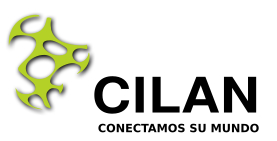Working hard in the development of technological projects that allow us to provide better communication solutions in both quality and performance has been our business vision.
We have highly qualified professionals to provide the best place service.
Internet telephony allows you to make phone calls using your Broadband connection.
Working hard in the development of technological projects that allow us to provide better communication solutions in both quality and performance has been our business vision. Thus, CILAN offers its clients the possibility of making Internet calls using a common telephone, without the need for a computer.
To the extent that we believe that the future of communications lies in what is called Voice over IP, it is that today we are not in a position to offer all the advantages of IP telephony with the quality and solidity of traditional telephony.
Our service provides you with a safe space to host your information, also having an external computer department that will back it up in duplicate every 24 hours, in a highly secure Data Center.
You can access 24 hours. to your information through the Internet, making inquiries or operations without any restriction.
This service allows you to create a private network for the exclusive use of your company’s branches. Communication is established through a broadband internet connection, or through point-to-point wireless connections in cases where there is a line of sight between the two. These connections are created based on hierarchy criteria in access to information.
What is a VPN?
The term VPN (Virtual Private Network: Virtual Private Network), has had several uses over time associated with remote connectivity of services, but today it has established itself as a synonym for IP-based data networks. As bandwidth capabilities increased greatly, Extranet calls began to be implemented, allowing internal and external users to communicate with a relatively fast implementation. However, this presents a fundamental problem: security. Current VPN solutions provide an answer to this problem. Using special encapsulation protocols and complex encryption procedures, data integrity and privacy of point-to-point connections are achieved in a transparent way, and a significant cost reduction when using a public network. There are at least two fundamental elements that together make it possible to form a VPN: encryption and encapsulation.
Encryption
Virtual private networks guarantee the privacy and confidentiality of information using encryption at the first level of security. In a very brief summary, encryption is a technique that encodes information in a way that makes it difficult or impossible to read, and decodes it so that it can be read again. The encoded information is called a cipher-text and the unencoded information is called clear-text. When information is transmitted from one point to another in a VPN, the VPN gateway of the origin point encrypts the information in cipher-text before sending it. At the other point, the receiving Gateway decrypts the information, that is, it becomes clear-text, and then sends it to the LAN.
Keys
A second level of security is achieved through the use of keys that prevent unauthorized access to information. A key is a secret code used by the encryption algorithm to create a unique version of cipher-text. This key could be compared to the combination used in a safe, providing security through the generation of unique keys and with high difficulty of being known. The level of security depends largely on the length of the key (key lenght).
Authentication
Encryption technology guarantees the privacy of information when crossing the Internet. Third level security authentication technology guarantees:
1. The identity of the VPN participants (gateways and clients are who they say they are)
2. The integrity of the information received (has not been altered along the way)
There are various authentication modes, the most widely used being username and password.
Encapsulation
Encryption, keys, authentication (and eventually certificates and digital signatures) are the security technologies that guarantee privacy in a VPN. Now, generally, the sending of information in a VPN is done between private addresses. That is, between non-routeable addresses via the Internet. This process of putting one packet into another is called encapsulation, and it is the basis of tunneling.
Effectiveness and economy
A VPN is really effective in terms of exchanging critical information between employees who work in remote offices, at home, or on public roads. It allows to distribute information in a secure way among sellers, suppliers or partners, even if there is a very important distance between them. VPNs reduce costs by eliminating the need for long distance phone calls, combined with Voice over IP (VoIP). Due to their stability and reliability, VPNs have become the de facto standard for the most critical communications, using strong cryptography that provides authentication and encryption. While authentication ensures the origin of the data, encryption provides the privacy of the data. Finally, it should be added that since the implementation is carried out using a standard protocol, it can operate with other VPN devices or network applications, ensuring scalability in the future.
